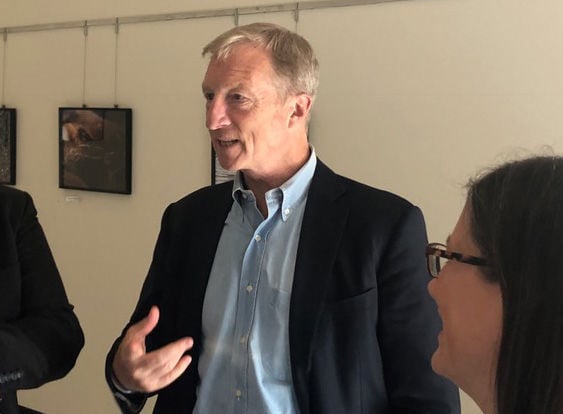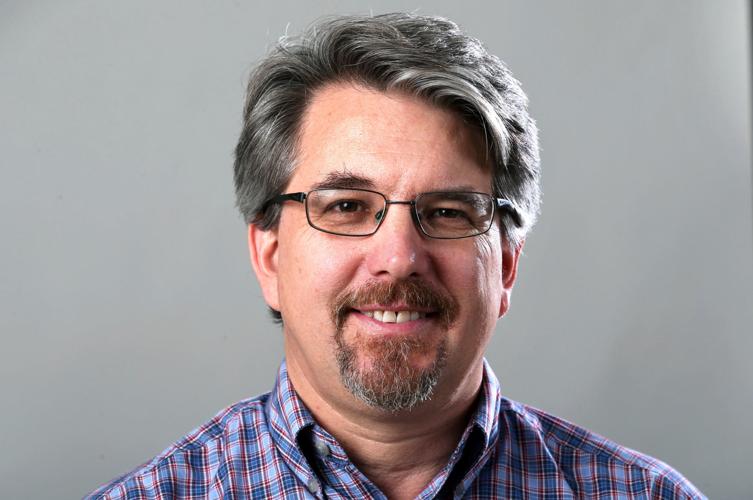Tom Steyerтs group NextGen Climate Action spent at least $22.5 million on a clean-energy initiative that failed miserably.
Prop. 127, which would have required regulated utilities to get 50 percent of their power from renewables by 2030, garnered just 30 percent yes votes. The opposition, led by the stateтs biggest utility, УлшжжБВЅ Public Service, demolished the initiative.
Arguably, Steyer could have taken that same wad of million-dollar bills and spent it in other ways that might have won just as much progress in reducing our dependency on fossil fuels. At least he could have shaken up УлшжжБВЅтs political power structure in a year when it almost happened but didnтt quite.
Take a look at the race for two seats on the УлшжжБВЅ Corporation Commission, the body that regulates utilities and could set the same exact 50 percent threshold if it chose to do so.
People are also reading…
The top vote-getter, incumbent Republican Justin Olson, was leading fourth-place Democrat Kiana Sears by just 84,000 votes Wednesday afternoon. Thatтs a margin of less than 3 percentage points.
A little effort in favor of Sears and fellow Democrat Sandra Kennedy, who is still in contention for the second open seat with Republican Rodney Glassman, could well have pushed both of them into office. There, they could have worked with Republican, pro-renewables commissioner Bob Burns, and maybe Republican commissioner Andy Tobin, to create a strong renewables requirement over a short time frame.
Or what about the other initiatives Steyer could have helped? The Outlaw Dirty Money initiative barely failed to make the ballot, by a few thousand petition signatures disqualified by the УлшжжБВЅ Supreme Court. Just a little juice from Steyer, who says he declares all of his political giving and does not make dark-money contributions, could easily have made the difference. Passing that initiative could have reduced the flow of money that helps keep УлшжжБВЅтs Paradise Valley power structure running the state.
A single million-dollar bill peeled off Steyerтs wad could probably have pushed Katie Hobbs over the threshold and into the УлшжжБВЅ secretary of stateтs chair. No, she couldnтt change climate-policy there, but she would be next in line for the governorтs seat and could ensure that voters get ample opportunity to use their voting rights, not have their votes suppressed.
If Steyer really wanted to raise his chances of changing УлшжжБВЅ politics, he should have worked through existing structures instead of creating his own and occupying the energy of so many people in his personal project.
County road failure
Now we really know what Pima County voters think. They really donтt trust Pima County government.
Back in 2015, county voters rejected six bond issues but nearly passed one that was strictly for roads. We could have fairly concluded that voters viewed the whole set of projects as just too much pork.
But now we have a new set of data, a new experiment, that refines the picture of what Pima County voters think, because this year we were voting only on a package of bonds for desperately needed road repair. And we were doing it at the same time city of УлшжжБВЅ voters were considering bonds for inessential but desirable park improvements.
The cityтs Prop. 407, which will put $225 million toward УлшжжБВЅ parks, passed by 54 percent to 46 percent with a margin of more than 10,000 votes. Meanwhile, Pima Countyтs Prop. 463, which would have led to more than $400 million in road repairs, lost by 57 percent to 43 percent, or nearly 40,000 votes.
Clearly, local votersт skepticism is specific to the county.
Since county supervisors arenтt likely to fire themselves over the failure of the bonds, might they place blame on longtime county administrator Chuck Huckelberry? Might this be the end of his run?
тI think the board majority supports Chuck still,т Pima County supervisors chair Richard ElУas told me. тI donтt see that changing.т
He is the one supervisor who doesnтt place roads as the top priority, and he doesnтt think his constituents, most of whom live in the city of УлшжжБВЅ, do either. Theyтve seen improvements from city road-repair initiatives.
Republican Supervisor Steve Christy told me he also suspects Huckelberry is safe for now, but he was discouraged that this final option for road-repair, which he supported, had failed. He would like to double the half-cent sales tax that supports the Regional Transit Authority and win the RTA power to run a road-repair program. But that would require approval from the Legislature and Pima County voters. Money might not flow till 2021.
тI think the overarching message that the voters stated loud and clear with the results, is that as frustrated and tired as they are of driving on decrepit roads, that fatigue did not overcome their skepticism of the county being able to implement and administer such a plan.т
Grijalva vs. Zinke
The Democratsт victory in the U.S. House will likely lead to a clash between Rep. RaУКl Grijalva and Secretary of the Interior Ryan Zinke.
Grijalva, a УлшжжБВЅ Democrat, will now take over as chair of the House Natural Resources Committee. He told me Tuesday night that an investigation of allegations of corruption or misconduct by Zinke will likely be high on his agenda.
Zinke had been the subject of numerous investigations by the Interior Departmentтs inspector general when in mid-October, he simply fired the inspector general. Expect Grijalva to take up any slack left by that firing and pursue those same probes using his subpoena power as chair of the committee.
Dark money wins again
The passage of Prop. 306 represented a second major victory this fall for the forces of secret political spending in УлшжжБВЅ.
First, as I mentioned above, dark-money groups sued to stop the Outlaw Dirty Money initiative from getting on the ballot. They won by disqualifying thousands of likely valid signatures that were collected by petition circulators who didnтt show up to court when issued subpoenas. The УлшжжБВЅ Supreme Court threw out the ballot issue because a new law requires subpoenaed circulators to show up or have their signatures thrown out.
The same court upheld a referendum, Prop. 306, that had a questionable combination of issues relating to the УлшжжБВЅ Clean Elections Commission. The cover story was that clean elections candidates would be prohibited from spending public money on services from political parties, as had happened in the past. The real aim: Giving the governorтs hand-picked regulatory review commission oversight over attempts by the clean elections commission to regulate dark money.
Prop. 306 passed, setting up a likely court challenge by the clean elections commission when the regulatory review council intervenes in its efforts to regulate political spending. In any case, dark (money) days are ahead in УлшжжБВЅ politics.




























